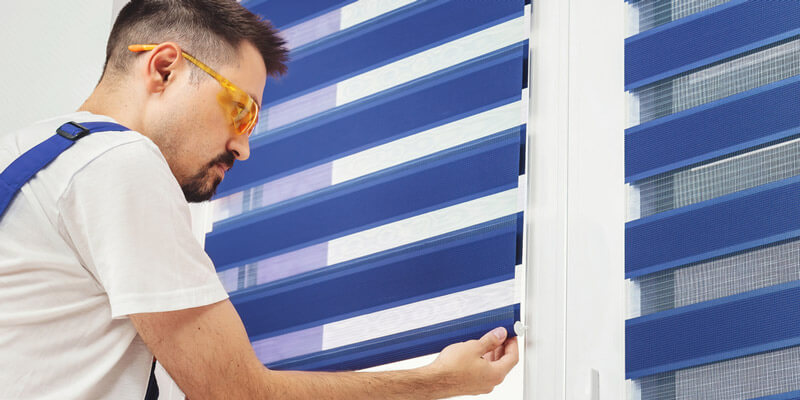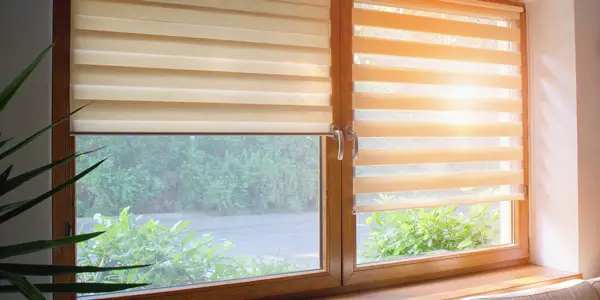Jalousie is the Bella Hadid of the window world. This type of window adds a strikingly distinctive look to any room – residential or commercial. It perfectly accentuates your architectural style for an admirable retro or classic vibe.

Sadly, Jalousie, or louvers as they are commonly called, are not great at keeping those irking neighbors’ noises at bay. Shutting the windows often won’t stop the chattering or siren noise from irritating your sensitive eardrums.
If you are currently facing this nerve-wracking situation, here’s the most comprehensive guide on how to soundproof jalousie windows to help regain your quiet and peace.
Why Jalousie Windows Need Soundproofing?
Jalousie windows have a unique design, which looks great in any setting and optimizes airflow. However, there’s a flaw in the design. The spaces between each glass slat allow noise to enter or escape your room.
If you live or work in a busy environment, louvers will only do a little noise reduction even when wholly shut.
So, homeowners with jalousie windows need to consider soundproofing them to block most of the noise traveling inside their homes.
Fortunately, here are some effective soundproofing tips that can transform your beautiful Jalousie windows into excellent sound blockers.
Best Soundproofing Techniques for Jalousie Windows
Soundproofing Jalousie windows is more challenging than other types of windows because of their design. Its multiple thin wooden or glass slats can’t offer an air-tight seal, resulting in noise leaking into your space.

Here’s how I got rid of the noise problem by using simple DIY tricks to minimize the amount of external noise traveling through my exquisite jalousie windows:
Create an air-tight seal with weather strips
With panes that never completely seal along their mating edges, jalousie windows permit noise into your space. So, the easiest solution is to use a rubber seal, particularly weather strips, to create a tight seal.
The process is a simple one. All it required was removing the window panes using a screwdriver and applying the insulating strips along the edges of the glass panes to fill up the spaces between the slats.
Once I was done, I replaced the panes, which took less than an hour to complete with no extra hand. I noticed a significant noise reduction and decided to further knock down the outside noise by trying the next tip.
Filling up gaps with acoustic caulk
Gaps around the window frame tend to sabotage your soundproofing efforts. So, check for gaps or holes in the window’s perimeter and fill them with acoustic caulk. They offer a high-quality seal against noise, smoke, draft, and even pests.
Don’t worry; this acoustic sealant comes in white, making them paintable once you’re done. However, you want to leave the caulk for 48 hours to dry before painting them.
Hang soundproof curtains
Another brilliant soundproofing technique to make your room quieter is using soundproof curtains. These thick fabrics are designed to absorb noise for a more serene space.
Generally, thicker soundproof curtains offer better soundproofing results. It’s the easiest way to block noise entering or escaping through the jalousie windows.
Unlike soundproof blankets, acoustic curtains come in different colors and styles to match and enhance your room’s decor.
Choose a soundproof curtain that covers your jalousie windows for the best noise reduction results. Installing them is a breeze and similar to hanging a regular curtain. There’s no particular skill required.
Install storm windows
Storm windows are an appropriate solution when it comes to blocking noise transmission through windows.
These types of windows are two panes of glass filled with gas for better sound and thermal insulation. They are another obstacle you can include in the noise path to keep the outside noise at bay.
Also, it helps protect your window against condensation to avoid costly damage to the window’s wood frame. The only concern with this model is it tends to block natural light and ventilation. So, it’s best not to cover the entire window with storm windows to avoid a gloomy, dark, and hot room, especially during hot summers.
More importantly, this soundproofing technique works better when all cracks or gaps around the windows are filled with a high-quality sealant.
Add a layer
Making your panes jalousie windowpanes thicker will help reduce the external through traveling into your space. There are several ways to do this, but these two are the most effective:
- Window inserts – You can place window inserts over your jalousie window, which creates an extra soundproofing layer. Typically, window inserts are made of dense materials such as mass-loaded vinyl or acoustic foam. They effectively block and absorb noise for a more comfortable space.
- Soundproofing film – is a thin transparent layer that goes directly on the jalousie windows to improve your home’s privacy. They are effective sound dampers that reduce noise by 5 dB. Any conventional soundproofing film will do the trick if you are not experiencing noise issues up to 100 dB.
Replace with an acoustic jalousie window
You might not be aware, but some jalousie windows are acoustically optimized to improve the room’s audio quality. They come pre-treated to block out noise.
So, if you hate to add soundproofing films or acoustic curtains to your jalousie windows, replace your existing one with a new one.
This step can be expensive, but it’s the best soundproofing decision for your room. They offer better noise reduction results than adding acoustic treatments to existing windows.
Compared to regular jalousie windows, acoustic types can knock down noise up to 32 dB. Achieving such noticeable noise reduction can be challenging with the soundproofing methods discussed above.
However, I’d only recommend this costly decision to homeowners with enough budget, currently renovating or dealing with serious noise issues. Combining two or more soundproofing tips mentioned above should help regain some peace and quiet in your home.
Install soundproof shutters and blinds.
Adding acoustic shutters and blinds to your vulnerable jalousie windows is a cost-effective solution to annoying noise issues.
Blinds
Blinds can help stop sound waves from entering or escaping your room. I often recommend homeowners purchase double-cell blinds. Thick blinds offer impressive noise absorption for quieter space. Keep in mind that blinds will add a different vibe to your room. So, ensure you pick one that matches your home decor.
Shutters
Like blinds but better, some shutters come soundproofed to soak up external noise. It offers a more significant result than blinds. It’s the closest thing to an acoustic jalousie window. You get an even better result when you support the shutters with other acoustic treatments like caulking and weatherstripping.
Related FAQs
No. Adding more layers to the window panes will only partially eliminate noise. However, they will knock down the noise for a serene environment.
Investing in acoustic jalousie windows is worthwhile if you are not on a tight budget. They offer superior insulation than conventional ones. This home window provides excellent noise reduction and thermal regulation. Plus, they boast high cost-to-value returns, meaning you can resell them at a reasonable price even after a decade.
For handy people with some experience, replacing their home window should be easy and straightforward. But if you have no experience, it’s best to hire a professional. The installation process is tricky, and you might need more than watching YouTube to replace your home windows properly.
Conclusion
Jalousie’s vulnerability to noise can be addressed by trying several soundproofing techniques. The most essential thing is adding more obstacles to the noise path without affecting the home window aesthetic.
Combining several methods guarantees a quieter room. However, replacing the jalousie window might be the only solution in rare cases where the noise issue persists.
Ultimately, gaps and holes in the wall or window perimeter can sabotage your soundproofing effort. Covering them with acoustic sealant is central to soundproofing and regaining your home peace.
Related Resources:
